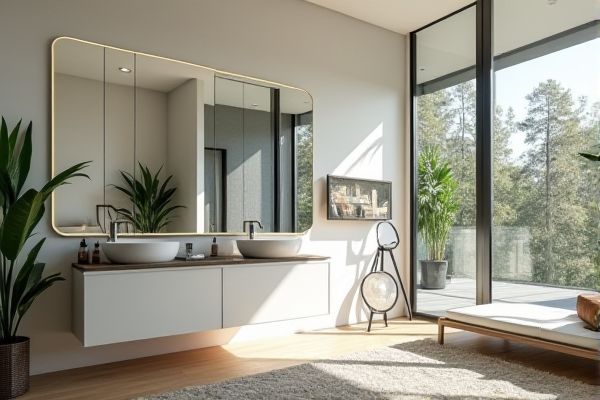
Mirrored walls amplify space and light by reflecting your interior, creating a sense of depth and brightness, while glass walls offer transparency and openness, connecting different areas visually without obstruction. Discover more about choosing between mirrored and glass walls to enhance your living or working environment.
Table of Comparison
| Feature | Mirrored Wall | Glass Wall |
|---|---|---|
| Transparency | Opaque with reflective surface | Transparent or translucent |
| Light Transmission | Reflects light, reduces direct light entry | Allows natural light to pass through |
| Privacy | High privacy due to reflection | Low privacy unless frosted or tinted |
| Visual Effect | Creates illusion of expanded space | Opens up space with clear sightlines |
| Applications | Gyms, dance studios, decorative interiors | Partitions, office spaces, exterior walls |
| Maintenance | Requires frequent cleaning to avoid smudges | Needs regular cleaning; prone to fingerprints |
| Durability | Fragile; prone to cracking | Strong when tempered or laminated |
| Cost | Moderate to high depending on quality | Varies; tempered glass more expensive |
Introduction to Mirrored Walls and Glass Walls
Mirrored walls consist of reflective surfaces that enhance light and create the illusion of expanded space, making them ideal for modern interiors and gyms. Glass walls offer transparency and openness, allowing natural light to flow freely while maintaining a sleek, contemporary aesthetic. Your choice between mirrored and glass walls impacts both the functionality and visual dynamics of your space.
Key Differences Between Mirrored and Glass Walls
Mirrored walls reflect light and images, creating an illusion of expanded space, while glass walls provide transparency and allow natural light to pass through, enhancing openness. Mirrored surfaces typically offer privacy by obscuring visibility, whereas glass walls maintain visual connection between spaces. Your choice depends on whether you prioritize visual expansion and privacy or openness and connectivity.
Aesthetic Impact on Interior Design
Mirrored walls enhance interior design by creating an illusion of expanded space and reflecting light to brighten rooms, making them ideal for smaller or darker areas. Glass walls offer a sleek, modern aesthetic that fosters openness and connectivity while maintaining separate spaces through transparency. Both options influence ambiance distinctly, with mirrored surfaces adding depth and glass walls emphasizing minimalism and fluidity.
Functional Advantages of Mirrored Walls
Mirrored walls enhance your space by reflecting light, making rooms appear larger and brighter, which optimizes natural illumination and energy efficiency. They also provide practical benefits for fitness areas and dance studios by allowing you to monitor form and posture effectively. Unlike glass walls, mirrored walls offer privacy while maintaining aesthetic appeal, making them functional for both residential and commercial environments.
Benefits of Installing Glass Walls
Glass walls enhance natural light penetration, creating brighter, more inviting interior spaces that improve mood and productivity. They offer modern aesthetic appeal with transparency that fosters openness while maintaining sound insulation for privacy. Energy efficiency can be improved with double-glazed glass, reducing heating and cooling costs compared to traditional mirrored walls.
Privacy Considerations: Mirrored vs Glass Walls
Mirrored walls offer enhanced privacy by reflecting light and obscuring visibility, making them ideal for spaces where confidentiality is crucial. Glass walls, while visually appealing and allowing natural light flow, often require additional treatments like frosted films or curtains to ensure privacy. Your choice between mirrored and glass walls should consider how much privacy is needed without compromising on aesthetics and light.
Light Reflection and Space Enhancement
Mirrored walls significantly enhance light reflection by bouncing natural and artificial light throughout the room, creating a brighter and more open atmosphere. Glass walls allow light to pass through, promoting transparency and visual connectivity while maintaining an airy, spacious feel. Your choice between mirrored and glass walls depends on whether you prioritize amplified brightness and illusion of space or unobstructed views and natural light flow.
Maintenance and Durability Comparison
Mirrored walls require regular cleaning to prevent smudges and fingerprints, often needing specialized glass cleaners to maintain their reflective quality, while glass walls are generally easier to maintain with standard cleaning agents due to their smooth surface. Durability-wise, glass walls are typically made from tempered or laminated glass, providing higher resistance to impact and breakage compared to mirrors, which may be more prone to cracking or shattering under stress. Your choice between mirrored and glass walls should consider the maintenance frequency and the environment's demands for durability to ensure long-lasting performance.
Cost Analysis and Installation Factors
Mirrored walls generally have higher initial material costs compared to standard glass walls, but the price may vary depending on thickness and quality of the mirror finish. Installation of mirrored walls demands specialized labor due to the need for precise alignment and careful handling to avoid damage, often increasing labor expenses. Glass walls typically involve simpler installation processes and lower material costs, but may require additional framing or treatment for durability and safety compliance.
Choosing the Right Wall for Your Space
Choosing between a mirrored wall and a glass wall depends on your space's specific needs and design goals. Mirrored walls enhance natural light and create the illusion of a larger area, ideal for smaller rooms or gyms, while glass walls provide transparency, allowing for unobstructed views and a modern aesthetic that connects indoor and outdoor spaces. Consider your priorities for privacy, light diffusion, and visual impact to determine which option best suits your environment.
 homyna.com
homyna.com